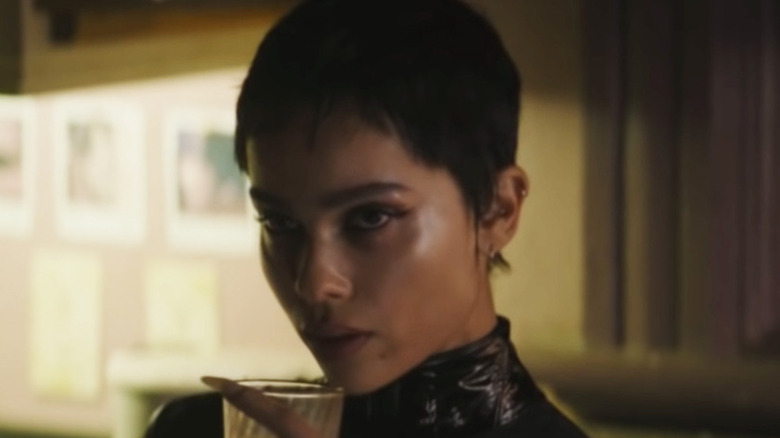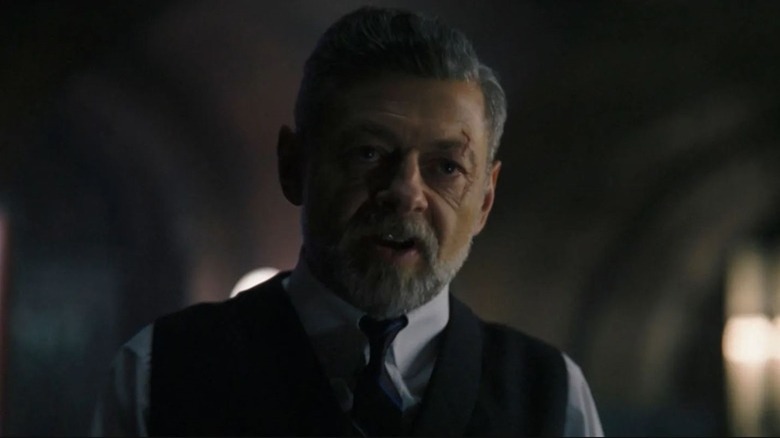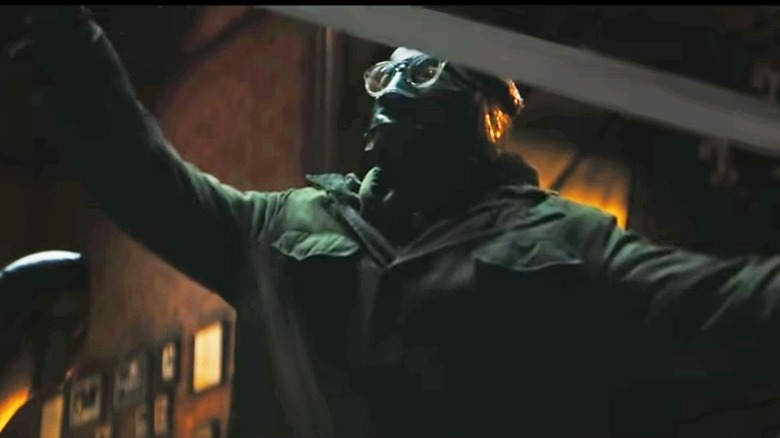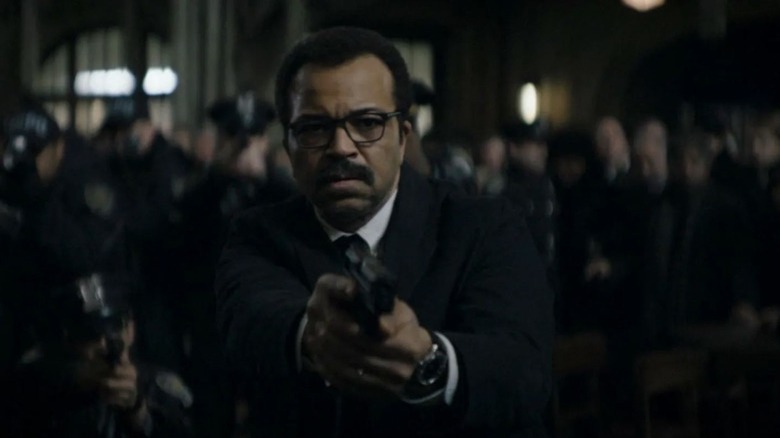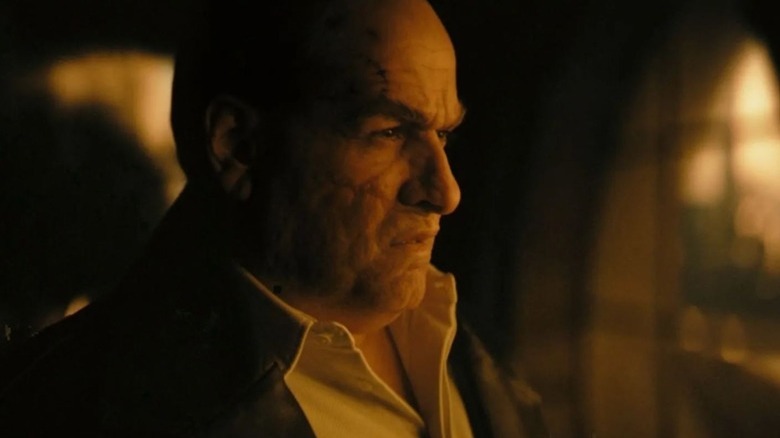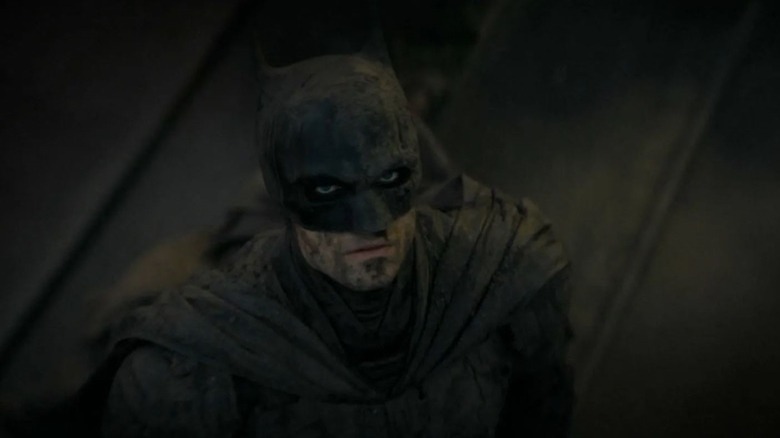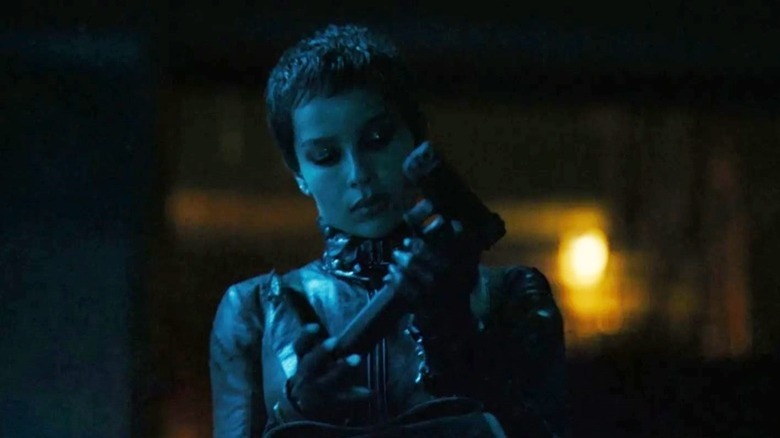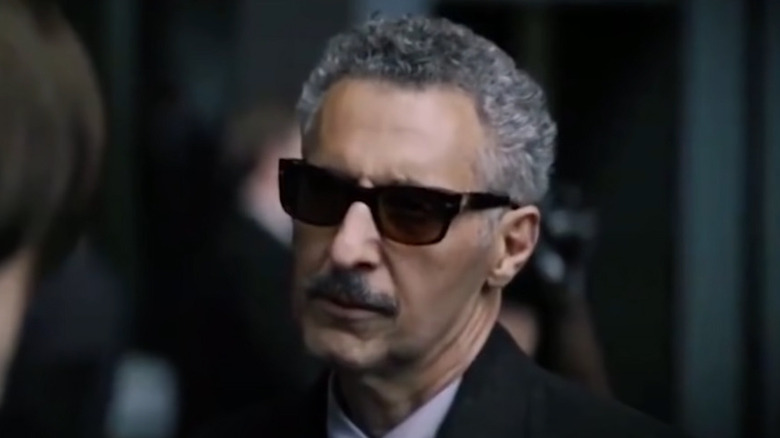The Best Performances In The Batman Ranked
There is no greater pleasure for a filmgoer than watching a movie full of great performances. Such excellent luck often leads to one of the best problems someone who truly loves movies can have: Being asked which actor, out of all these outstanding players, did the best job. It feels impossible to choose — but at the same time, the prospect of analyzing each performance to discern the very best one is tantalizing to any cinephile.
So it goes with 2022's "The Batman." Having earned acclaim from critics and everyday fans alike, "The Batman" seems certain to drive conversations among moviegoers for a long time to come. Inevitable among that chatter will be people asking which performance in the film stands above the rest. Is it Paul Dano's decidedly different take on the Riddler? Could it be Colin Farrell's eye-catching work as the Penguin? Where does Robert Pattinson's turn as the Dark Knight himself land? Fans face a delightfully difficult problem in breaking down the talent on display in this superb superhero film — but we think we have the solution. These are the best performances in "The Batman," ranked from the simply strong to the utterly iconic.
7. Alfred
Every Batman needs an Alfred, and consistently, every Alfred has been an outstanding on-screen presence. From Michael Gough's endlessly patient turn in the role to Jeremy Irons' insightful and vaguely annoyed presence, each take on the famous butler has proved to be interesting in its own way.
Andy Serkis certainly maintains this tradition as a particularly keen-minded Alfred. He's a major asset on the Riddler case, providing a fundamental bit of unraveling regarding one of the first puzzles. While every Alfred aids his respective Batman, this may be the biggest butler assist yet. Serkis' Alfred also conveys a sense of worry and rising hopelessness about Bruce Wayne. He verbalizes this as frustration at his master's refusal to address business matters, but Serkis' gaze tells the whole story. He's not so much worried about Bruce meeting with accountants as he is about Bruce failing to be anything more than a masked vigilante.
The problem is, there's simply too little of Alfred to give moviegoers more than a brief impression. His best scene, in which he offers an emotional explanation of Thomas Wayne's one moment of weakness, is undeniably well done. However, "The Batman" leaves the relationship between him and Bruce largely alone. This might be a great performance, but there's just not enough of it to put it higher on our list.
6. The Riddler
Becoming the newest Dark Knight can't be an easy task. However, any actor stepping into Batman's shoes has many prior examples to learn from. Sure, he may have to compare himself to a dozen other performers, but with each actor doing something different with the role (and almost all of them having their defenders), there's a pre-existing flexibility present. In taking on the role of the Riddler, however, Paul Dano had a considerably more narrow path to follow.
That Dano is able to take up the question mark-emblazoned mantle and deliver a distinctly different take on Batman's most intelligent villain is a tremendous credit to him. He makes many exciting and challenging choices that reference frighteningly real-world threats, like online radicalization and the rise of conspiracy theorists willing to take up arms to make their point.
Despite this, Dano's Riddler is often overwhelmed by plot mechanics and even a bit overshadowed by more impressive performances. His puzzles, master plan, and recruitment of the disaffected are all interesting and legitimately scary. Unfortunately, they remain somewhat separate from the character. In order to maintain the mystery, viewers never really get to see Dano make the most compelling aspects of the Riddler happen — his addresses to the people of Gotham are disconcerting, but they're not broadcast live. He ends up being an interesting font of plot development at the cost of characterization.
5. James Gordon
Jeffrey Wright brings immense humanity to every role. His dogged, intelligent James Gordon is no exception. Much like Andy Serkis' Alfred, Wright's Gordon is probably the smartest incarnation of the character to hit the silver screen. Gary Oldman's Gordon, from Christopher Nolan's "Dark Knight" trilogy, is clearly intended to be smart, but we never see those thoughts in motion, only their results. Pat Hingle and J.K. Simmons' incarnations (from the Tim Burton and Zack Snyder films, respectively) are largely sidelined by plot mechanics that leave the character with limited screen time and even less to do within it. Wright, however, gets to show off his intellectual muscle.
This is most evident in a scene where he and Batman collaborate on a jailbreak while more than a dozen of Gordon's colleagues look on, entirely unaware. Wright is even given a chance to show off some impressively subtle comedic chops, earning one of the few laughs "The Batman" has to offer. Alas, even at nearly three hours, "The Batman" has a lot going on. As a result, much of what Wright gets to do is little more than react to Batman's actions. It's an excellent performance, but Wright deserves more real estate to show viewers all that he is capable of.
4. The Penguin
Burying Colin Farrell in makeup and prosthetics to play the Penguin seemed an odd choice, for sure. However, it's impossible to argue with the results. Farrell's Penguin is a classic career criminal, who mixes unearned swagger with entirely understandable annoyance. He likes his work and feels no need to apologize for it, but he's not interested in pursuing the kind of villainy that, say, the Riddler does. The amusement and fear he feels towards the legendary Batman feels right for a Gotham City criminal: The Dark Knight is fine to chuckle at ... until you're the one running away from him.
It's hard to choose Farrell's best moments, as every time he's on screen, he gives the audience something new. This results in a remarkably nuanced performance, which is especially impressive, given the fact that he could have easily been a two-dimensional baddie. Many fans are excited to cast the sequel's villain, but the solution is right in front of our eyes: Give the Penguin the gig so we can see what Farrell can really do.
3. Batman
Robert Pattinson delivers a cinematic Batman who is very different from his predecessors, yet still feels faithful to the character. After Bale's growling Caped Crusader and Affleck's bruiser-for-justice, Batman had probably gone as far into hyper-masculinity as the character could bear. Intelligently, Pattinson's interpretation pulls back hard on that trajectory, and gives viewers a vulnerable vigilante who doubts himself, his mission, and his results.
When he wonders aloud if Batman is making a difference, he doesn't sound enraged or depressed. Rather, he sounds confused — even lost. The Bat-film that doesn't show the Waynes' deaths turns out to be the one starring a Batman still stuck in that moment. To be clear, Pattinson's Bruce isn't a child, but that wounded little boy is eternally perched on his shoulder. When he faces any setback, he gives voice to that small, scarred part of himself.
While Pattinson's work in "Tenet" indicates how skillfully he could portray Bruce Wayne's disaffected playboy persona in sequel films, in "The Batman," he takes Bruce in a different direction. Mopey and seemingly uncomfortable in his own skin when he's not in costume, he seems like a boy who grew into his father's clothes overnight. Interestingly, this Bruce feels like one who could believably become Keaton's weird, jittery, full-grown millionaire. But for now, he stands on his own two feet as a Batman for the ages.
2. Catwoman
Zoe Kravitz's Catwoman is by far the most multi-faceted take on the character to ever hit the silver screen. Selina Kyle's complexities, long on display in the comics, are finally present: There's the affection and concern for those pushed aside by society, the Robin Hood-esque thievery, and the complicated relationship to her past. This Catwoman is seductive, sure, but she's also coiled with righteous fury and marked by trauma, though she's not defined by it. Somehow, Kravitz makes it all work.
There are too many impressive Catwoman moments in this film to choose an absolute best scene, but Selina's final confrontation with Carmine Falcone is undoubtedly worth singling out. In this one interaction, Kravitz showcases nearly everything that makes her performance so special, then adds a glimpse of the vulnerability hidden behind her aloof façade. The complex and genuine sorrow she feels regarding her mother's death, brought to the fore in this devastating scene, is utterly arresting in its lack of artifice. In a film centered around a man driven by trauma, she seems to be the only one truly harnessing her pain to improve her life, along with the lives of others.
1. Carmine Falcone
It can be challenging for a character to make an impression in a film full of icons like Alfred, James Gordon and the Riddler. That's especially true when the character in question is crime boss Carmine Falcone, a relatively minor Batman villain best known for being Catwoman's father — but only in certain continuities. Thankfully, no one seems to have told John Turturro this, so he just went ahead and delivered the best performance of the film.
Consistently relaxed and unbothered by the wild world around him, Carmine Falcone is a different sort of evil. Unlike the Penguin, he feels no need to center himself in the flashy Iceberg Lounge. Neither does he long to broadcast his agenda across the internet, like the Riddler. Instead, Falcone simply strides through this film, confident in his untouchability. He knows he's at the top of the heap — he doesn't need to prove it.
We get a glimpse of how Falcone earned his success in the way he brings his "gifts" to bear on a confused and distraught Bruce Wayne. Turturro showcases Falcone's smooth, seductive evil when he unfurls a lie so close to truth and told with such apparent empathy, it cuts Bruce to the quick. What's more, Falcone has no clue he's Batman. He has nothing to gain from robbing Bruce of his belief in his father as a good man — he does it merely because he can. And when he does, we can't look away.
